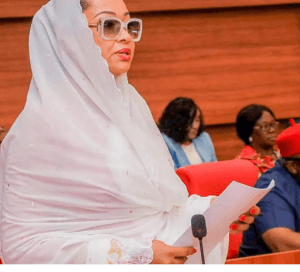Senator Natasha Cries Out at UN, Calls Her Suspension Illegal
In a bold international appeal, Senator Natasha Akpoti-Uduaghan, who represents Kogi Central in the Nigerian Senate, has declared her suspension from the Red Chamber illegal. Speaking at the Women in Parliament session of the Inter-Parliamentary Union (IPU) Meeting in New York on Tuesday, she accused Senate President Godswill Akpabio of political victimization, claiming her suspension was retaliation for a petition she filed against him over alleged sexual harassment.
With a heavy heart and in visible distress, Senator Natasha told the global parliamentary gathering that she had been unfairly silenced for daring to speak out.
> “I was suspended illegally because I submitted a petition of sexual harassment against the President of the Nigerian Senate, Senator Godswill Akpabio,” she lamented.
Her six-month suspension, handed down by the Senate, came with stringent conditions, including the withdrawal of her security, official vehicles, and salary. More alarmingly, she revealed that she was banned from stepping into the National Assembly premises or even identifying herself as a Nigerian senator during the period of her suspension.
Describing her ordeal as a “clear case of political victimization,” she pleaded for justice, emphasizing that her fight was not just about her but about women in Nigeria facing suppression.
“I am not here to bring shame to our country but to seek help for the women in Nigeria,” she declared.
A Battle Beyond Suspension
Senator Natasha’s claims add to the growing controversy surrounding the leadership of the Senate and the broader issue of gender rights in Nigerian politics. The circumstances of her suspension have drawn criticism from activists and legal experts, with many questioning whether due process was followed in penalizing her.
While the Nigerian Senate has defended its decision, citing alleged misconduct on her part, Natasha’s outcry at an international forum has intensified pressure on the National Assembly to justify its actions.

Her case highlights the persistent struggle of female politicians in Nigeria’s male-dominated political landscape. It also raises questions about the independence of the legislature and whether internal disciplinary measures are being used as tools for silencing dissent.
As the debate rages on, eyes are now on the Nigerian government and the international community to see how they will respond to this unfolding drama. Will Natasha Akpoti-Uduaghan get justice, or will this be another case of power trumping accountability?


